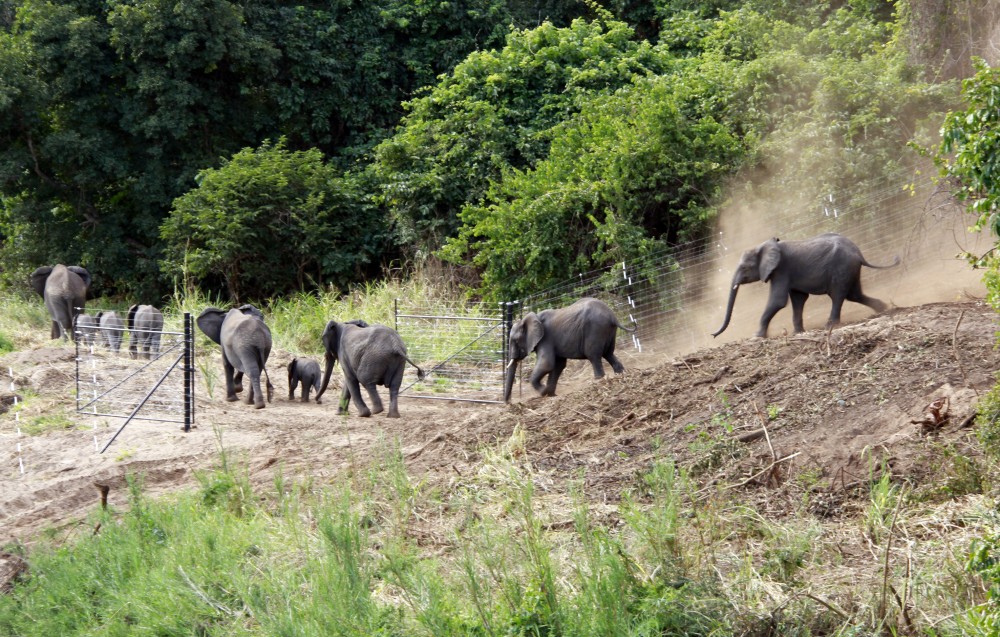One of the world’s largest and most significant elephant translocations kicked off on July 3rd from within Liwonde National Park. In just one week, and as of today, 92 elephants have been successfully captured from Liwonde, transported 450 kilometers by truck, and released in Nkhotakota Wildlife Reserve, all within Malawi. Of the 80 individuals, six are bulls and the rest are family units made up of matriarchs and their young.
 © Will Whitford
© Will WhitfordAfrican Parks, a conservation NGO who manages national parks and protected areas across Africa, is leading the translocation of up to five hundred elephants from Liwonde National Park and Majete Wildlife Reserve from southern Malawi to Nkhotakota Wildlife Reserve in central Malawi. All three reserves are managed by African Parks in partnership with the Malawi Department of National Parks and Wildlife (DNPW).
Two hundred and fifty elephants are being moved over July and August this year from Liwonde, with another 250 being moved from Liwonde and Majete combined in 2017. In addition to these elephants, thousands of other animals including sable, waterbuck, zebra, kudu, eland and warthogs are also being translocated all with the goal of repopulating Nkhotakota and restoring it to its former glory after years of rampant poaching.
The operation has two objectives: to relieve pressure from the elephant surplus in Liwonde and Majete, and to restock Nkhotakota which supported more than 1,500 elephants 20 years ago, but today has fewer than 100. Liwonde and Majete are source populations for elephants and are at or nearing capacity (with populations of 800 and 400 elephants respectively), resulting in habitat degradation and high levels of human-wildlife conflict. As Malawi is a densely-populated, agro-based country, no ecological corridors exist to allow for natural migration. The “500 Elephants” initiative is a human-assisted migration providing the best chance of a long-term and sustainable future for these elephants.
“Having just returned from Liwonde, I am thrilled with progress made so far in just the past week” said Peter Fearnhead, CEO of African Parks. “This translocation is a very specialized operation and a massive logistical challenge, but we’ve assembled the best possible team of experts to undertake such a feat”. Only cohesive family units are moved together to limit stress and prevent the destabilization of family groups; the capture and translocation is extremely well managed with an array of short, medium, and long-acting tranquilisers which mitigate and control stress responses.
African Parks has spent the last nine months preparing for the giant move which has included the grading and creation of road networks, perimeter fencing of both Liwonde and Nkhotakota, the creation of a sanctuary within Nkhotakota for the newly released elephants, and the hiring of hundreds of local employees to carry out the infrastructure developments positively impacting the local economy. Importantly, since assuming management of Nkhotakota last year, African Parks has completely overhauled the law enforcement and anti-poaching efforts allowing for the safe restocking of wildlife to the reserve.
Under mounting pressure from poaching, habitat loss and human-wildlife conflict, the African elephant is being increasingly threatened in many parts of the continent. Numbering more than 10,000,000 a century ago, recent census results indicate they have been reduced to fewer than 450,000. With as many as 40,000 elephants being poached every year to feed the insatiable demand for ivory, their rate of offtake now outstrips their birth rate putting their long-term survival at risk.
“Most stories we hear about elephants in Africa are doom and gloom” continued Peter Fearnhead; “this translocation of 500 elephants, which is a pivotal moment for Malawi who is emerging as a leader in African elephant conservation, is a story of hope and survival; it’s a story of possibility”. African Parks is responsible for managing approximately 90% of Malawi’s elephant population, as well as almost 15,000 elephants combined among all the parks under their management across Africa. This giant initiative has been made possible with the generous support from the Dutch Postcode Lottery, the Wyss Foundation, The Wildcat Foundation, Donna and Marvin Schwartz, Dioraphte, and the People’s Postcode Lottery.